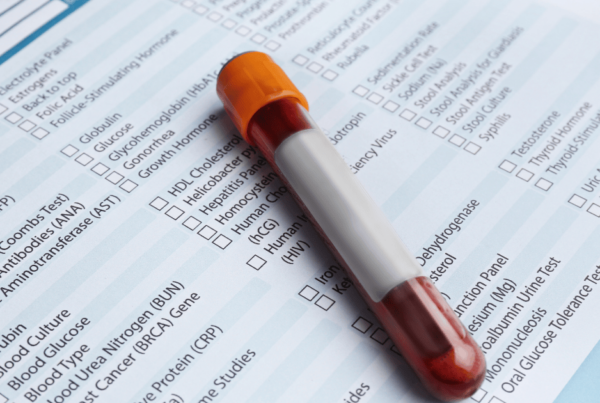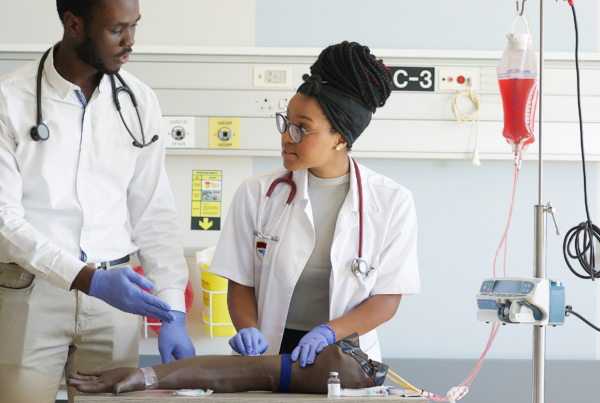The fear of needles, medically known as trypanophobia, is one of the most common anxieties related to healthcare. It affects people of all ages and backgrounds, with up to 10-16% of adults actively avoiding medical care due to this fear. For some, the fear of needles is mild and manageable; for others, it can be intense, leading to serious consequences if it prevents them from seeking medical help.
At Phlebotomy Now School, we understand the importance of addressing this fear with compassion and expertise. Our goal is to train phlebotomists to handle patients with trypanophobia gently and professionally, equipping them with techniques to reduce patient anxiety and create a comfortable environment. By understanding the roots of this fear and offering tailored support, phlebotomy professionals can make a significant positive impact on patient care.
| Key Takeaways: Understanding the Fear of Needles |
| Needle phobia is common and manageable: Up to 16% of adults experience trypanophobia, but with the right techniques, many people can undergo medical procedures with less distress. |
| Early intervention is beneficial: Addressing needle phobia early can prevent serious health complications and improve your quality of life. |
| Therapies and coping mechanisms work: Cognitive-behavioral therapy, exposure therapy, and relaxation techniques are highly effective in reducing anxiety. |
What Is Trypanophobia (Fear of Needles)?
Trypanophobia is a specific phobia characterized by an intense fear of medical procedures involving needles, such as vaccinations, blood draws, and IV treatments. Unlike general anxiety, trypanophobia is directly related to needles in a medical setting, often leading individuals to avoid crucial healthcare appointments, even when they know the risks.
People with needle phobia might experience an overwhelming sense of panic at the thought of a needle. This phobia can be triggered by various factors, from previous traumatic experiences to genetic predispositions or related anxiety disorders. In severe cases, trypanophobia may cause fainting, heart palpitations, nausea, and dizziness, significantly impacting the person’s life and health.
Why Is It Important to Address Trypanophobia?
When left untreated, trypanophobia can lead to a cascade of health issues due to the avoidance of necessary medical care. Regular blood tests, vaccinations, and other medical interventions play a critical role in detecting and managing health conditions. For those with chronic illnesses, avoiding medical care due to needle phobia can exacerbate health risks, making early treatment and prevention nearly impossible.
With proper treatment and support, individuals can gradually overcome the worst effects of needle phobia, allowing them to access medical care with less fear and more confidence.
Common Causes of Needle Phobia
Understanding the underlying causes of trypanophobia is essential for healthcare providers. Phlebotomists and other healthcare professionals can better assist patients when they recognize what might be triggering their anxiety. Common causes of needle phobia include:
- Past Traumatic Experiences: Painful or traumatic encounters with needles in the past, especially in childhood, can create lasting fear.
- Family History: Genetics and learned behavior can play a role. If close family members have a fear of needles, children might adopt similar anxieties.
- Hypersensitivity to Pain: People with low pain tolerance or heightened pain sensitivity may fear needles because of anticipated discomfort.
- Related Anxiety Disorders: Individuals with disorders like obsessive-compulsive disorder (OCD), generalized anxiety disorder (GAD), or post-traumatic stress disorder (PTSD) are more likely to develop specific phobias, including trypanophobia.
- Fear of Loss of Control: The sight of needles can trigger a sense of helplessness or fear of loss of control, particularly in medical environments where one feels vulnerable.
By identifying these causes, phlebotomists can approach each patient with a personalized and compassionate strategy, making them feel safe and supported.
Symptoms of Trypanophobia
Recognizing symptoms is the first step in managing trypanophobia. These can vary from mild discomfort to extreme reactions, which may include:
- Dizziness or Fainting: The vasovagal response, which causes a drop in blood pressure, can lead to fainting when a person sees a needle.
- Increased Heart Rate and Sweating: Anxiety-induced symptoms like a racing heart or sweating are common.
- Nausea and Upset Stomach: Extreme anxiety may cause gastrointestinal discomfort or even vomiting.
- Insomnia Before Medical Appointments: People with needle phobia may struggle to sleep the night before an appointment.
- Avoidance of Healthcare Settings: The most telling symptom is the avoidance of healthcare environments altogether, leading to potential health risks.
Effective Techniques to Help Patients Manage Needle Phobia
Phlebotomy Now School teaches a variety of strategies to ensure patients with trypanophobia feel comfortable and safe. Here are some of the most effective methods used to reduce needle phobia:
Build Trust and Communicate Clearly
A warm, patient-centered approach can make a tremendous difference. Phlebotomists should introduce themselves, explain each step of the process, and reassure patients. Communicating each action lets patients feel more in control, reducing their anxiety.
Practice Gentle Needle Techniques
Using smaller, less intimidating needles, like butterfly needles, can help reduce the fear response. Phlebotomists should aim for a calm, steady approach with minimal skin contact, making the procedure as gentle as possible.
Employ Distraction Techniques
For some patients, redirecting their attention can be helpful. Chatting with the patient, suggesting they look away, or asking them to focus on deep breathing can shift their focus away from the needle.
Encourage Deep Breathing and Muscle Relaxation
Calm breathing and relaxed muscles can reduce pain perception. Encourage patients to take slow, deep breaths while relaxing their arm to minimize discomfort.
Offer Positive Reinforcement
Acknowledging the patient’s bravery and validating their efforts helps create a more positive experience. Positive reinforcement can turn a fearful experience into a more manageable one.
Treatment Options for Overcoming Trypanophobia
While phlebotomists can use various techniques to reduce anxiety during procedures, patients with severe trypanophobia may benefit from professional treatments to help them better cope long-term.
Cognitive Behavioral Therapy (CBT)
CBT is a structured therapy that helps patients identify and change negative thought patterns. For needle phobia, CBT can provide coping mechanisms and reduce the physical symptoms of anxiety. Phlebotomy Now School educates its students on the basics of CBT techniques, ensuring they can refer patients to therapists when necessary.
Exposure Therapy
Exposure therapy involves gradually introducing patients to the feared object—in this case, needles. By breaking down the fear response over time, patients become more accustomed to needles, reducing anxiety during medical procedures.
Medication
For extreme cases of needle phobia, doctors may prescribe anti-anxiety medication to be taken before procedures. Although medication is not a cure, it can make it easier for patients to manage their fear.
Tips for Patients to Reduce Needle Anxiety
Patients can also take proactive steps to manage their needle phobia, such as:
- Bring a Supportive Person: Bringing a friend or family member can provide emotional support and reassurance.
- Focus on the Benefits: Remember the purpose of the procedure and the positive impact on health.
- Visualize a Calm Place: Visualizing a calming location, such as the beach or a favorite quiet place, can help shift focus away from the needle.
- Communicate with Healthcare Providers: Informing healthcare professionals about needle phobia allows them to adjust their approach and provide additional support.
Phlebotomy Now School: Training Professionals to Handle Needle Phobia with Care
At Phlebotomy Now School, we train our students to address needle phobia with empathy, professionalism, and skill. Our courses teach gentle techniques and provide hands-on experience in managing patient anxiety, ensuring graduates are prepared to provide compassionate care. By understanding the root causes and techniques for easing trypanophobia, Phlebotomy Now students are well-equipped to help patients overcome their fear of needles.
FAQs About Trypanophobia
Can trypanophobia go away on its own?
For some, needle phobia may lessen with age or experience. However, in many cases, proactive treatment is necessary to manage symptoms effectively.
Are children more likely to have needle phobia?
Yes, trypanophobia is common in children, and up to two-thirds experience this fear. Many may grow out of it, but some carry the phobia into adulthood.
What if I feel faint at the sight of needles?
This is known as a vasovagal reaction. It may help to lie down during the procedure and inform the healthcare provider, who can take steps to make you more comfortable.
What treatments are most effective for needle phobia?
Cognitive Behavioral Therapy (CBT) and exposure therapy are among the most effective methods. Additionally, medications and relaxation techniques may be recommended.
Is there a way to prepare for a medical procedure if I have trypanophobia?
Yes, start by practicing relaxation techniques in the days leading up to the appointment. Bring a support person if possible, and let the medical staff know about your phobia so they can assist with personalized strategies.
Conclusion: Moving Beyond Needle Phobia
Overcoming the fear of needles is a journey that can significantly improve health outcomes. For those affected by trypanophobia, managing this fear means opening the door to essential medical care. At Phlebotomy Now School, we emphasize the importance of empathy and skilled patient interaction, preparing phlebotomy professionals to make a difference in their patients’ lives. By building trust, using calming techniques, and educating patients on effective coping strategies, we can help reduce needle phobia one step at a time.
Ready to Conquer Your Fear of Needles?
At Phlebotomy Now School, we’re here to support you in overcoming needle anxiety while learning essential skills. Our compassionate, one-day phlebotomy certification course is designed to help you gain confidence in a safe and supportive setting.
Take the next step toward a rewarding career. Enroll Today!


